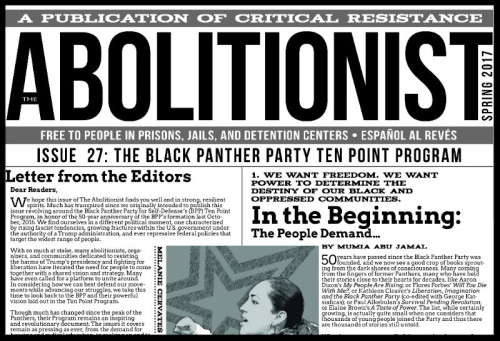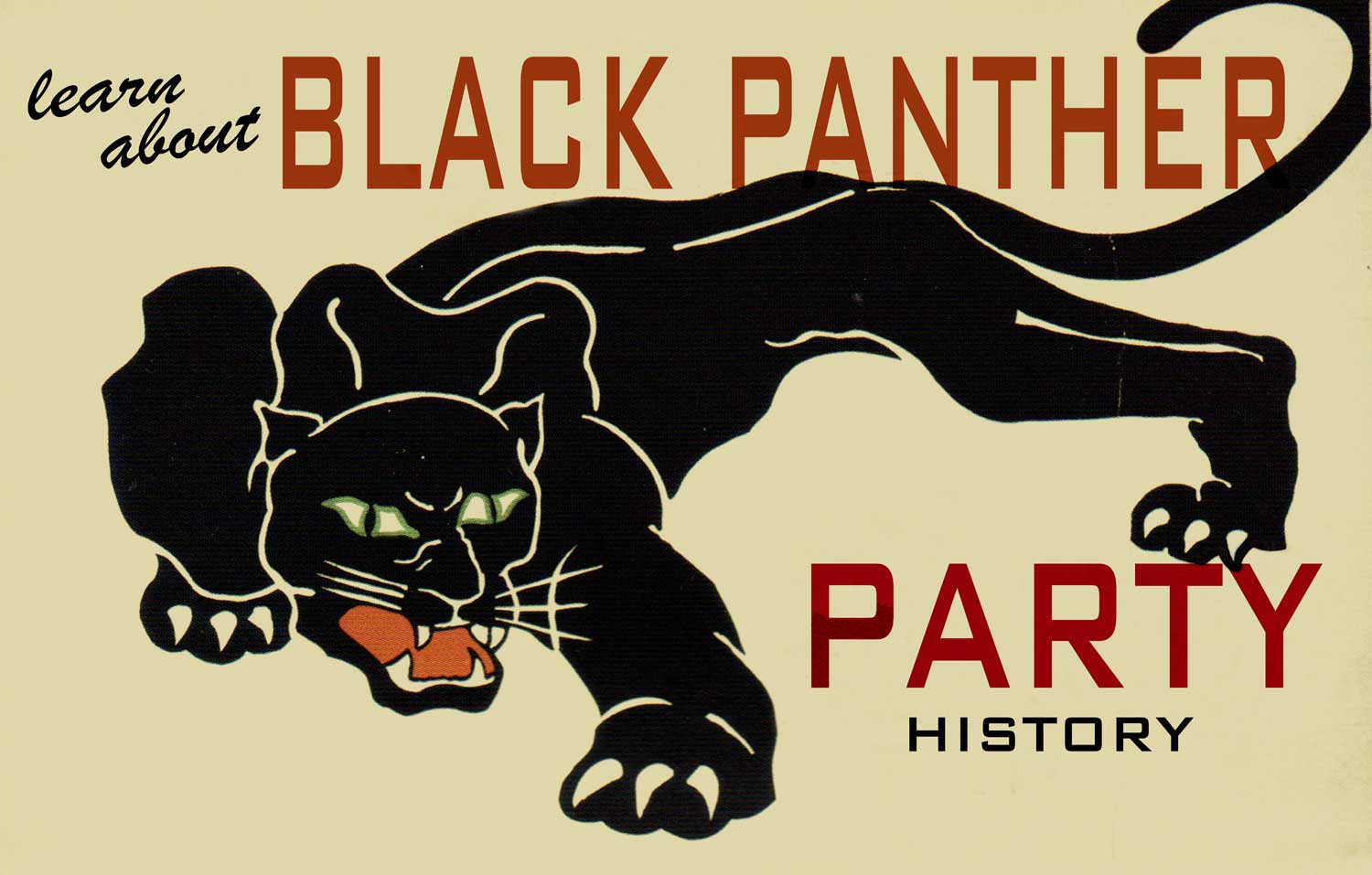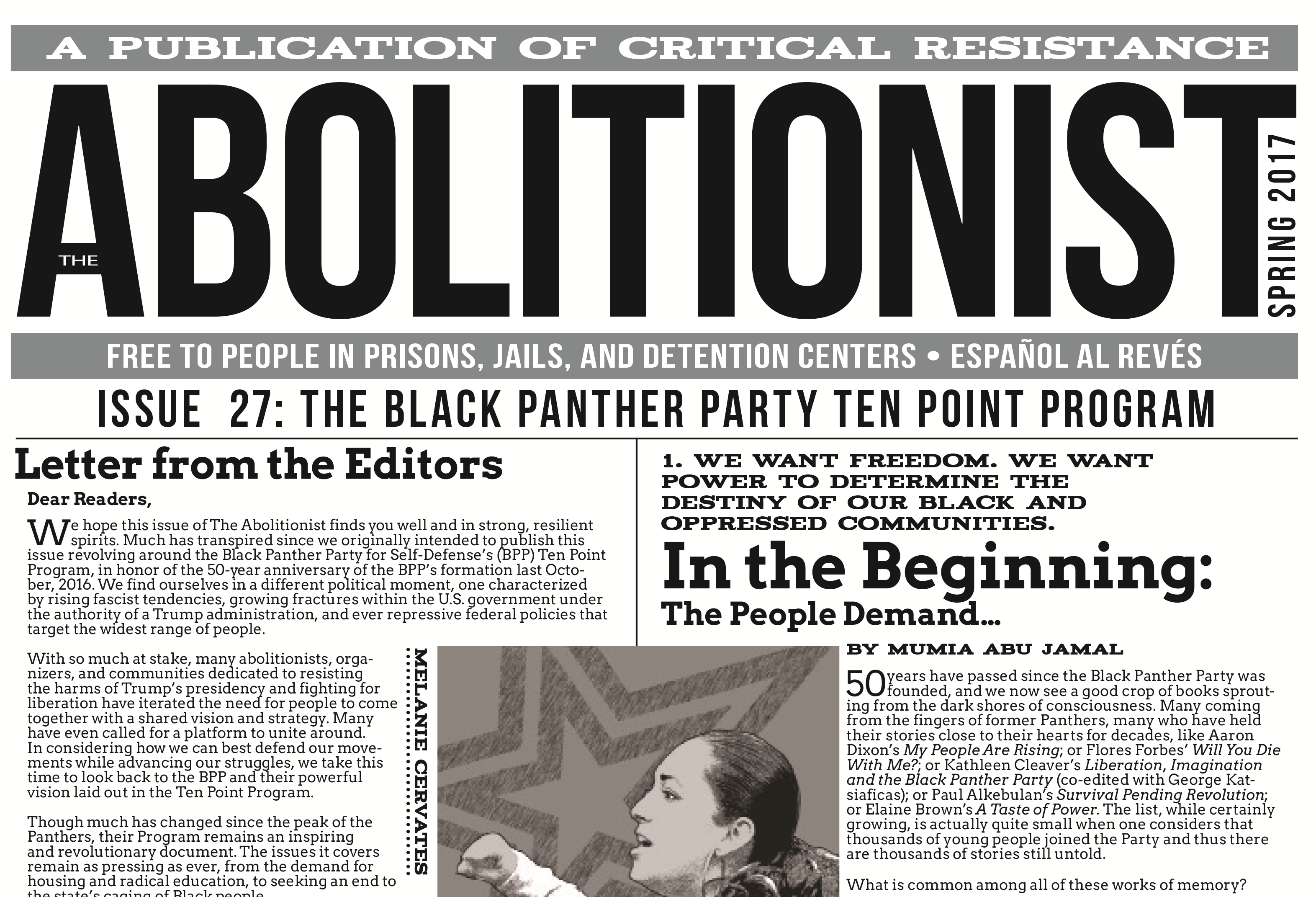
Our latest issue of The Abolitionist Newspaper has finally arrived! Issue 27 is themed around the Black Panther Party’s Ten Point Program, in honor of the 50th anniversary of the founding of the BPP in October of 2016. Help us get this issue free to over 5,500 people locked up in prisons, jails, and detention centers across the country by subscribing today and receiving a copy.
We hope that this issue of The Abolitionist contributes to the growing thought and movement seeking to strengthen and sharpen our collective resistance in this current moment, and for the coming years. With pieces including an opening from former Black Panther and current political prisoner Mumia Abu Jamal, to an elaboration of the BPP’s internationalism by civil rights and Black Power scholar Robyn Spencer, to the sharp prescriptions from imprisoned writers on responding to Trump’s fascism, we are humbled by the range of contributions to this issue, the historical lessons they draw, and their reflection on current struggles toward liberation in the spirit and ongoing legacy of the Black Panther Party, fifty years later.
See below for the contents of this issue, and a special preface by Mumia Abu-Jamal.
Check out our page dedicated to the artistic contributions to this issue of the paper.
The Abolitionist, Issue 27 – The Black Panther Party Ten Point Program
- Letter from the Editors
- In the Beginning: The People Demand… by Mumia Abu-Jamal
- Ban the Box Movement by Manuel La Fontaine
- Until We Win: Black Labor and Liberation in the Disposable Era by Kali Akuno (originally published in Counterpunch)
- Fighting to Win Decent Housing by Picture the Homeless
- Know History, Know Self by Alykhan Boolani
- The Oakland POWER Projects: Decoupling Policing from Health Services: Empowering Healthworkers as Anti-Policing Organizers by Critical Resistance Oakland
- Black Liberation and the Abolition of the Prison Industrial Complex: An Interview with Rachel Herzing by Casey Goonan (originally published in Propter Nos)
- The Black Panther Party’s Anti-Imperialist Vision by Robyn C. Spencer
- Arming Ourselves With The Most Powerful Ammunition There Is: A Collective Memory and Connected Link in Our Long Chain of Struggle by Lacino Hamilton
- Juries and “Justice” by Demontrell Miller
- Malcolm X and Human Rights in the Time of Trumpism: Transcending the Masters Tools by Ajamu Baraka (originally published in Black Agenda Report)
- Thoughts on Our Current Political Moment – Resisting Trump by Asar Imhotep Amen
- The Attica Interview Project by Critical Resistance New York City
Art and Images
- All Of Us Or None/Legal Services for Prisoners with Children
- Asian Youth Promoting Leadership & Advocacy (AYPAL)
- California Coalition for Women Prisoners
- Melanie Cervantes / Dignidad Rebelde
- Kate DeCiccio
- Emory Douglas
- Eastside Arts Alliance
- Freedom Archives
- ICE-Free NYC
- It’s About Time/Black Panther Legacy and Alumni
- Kevin “Rashid” Johnson
- Nicolas Lampert / justseeds.org
- Vikki Law
- Saba “Malik” Makkali
- Oree Original
- Savannah Spirit
- Western Regional Advocacy Project
1. We want freedom. We want power to determine the destiny of our Black and oppressed communities.
In the Beginning: The People Demand…
by Mumia Abu-Jamal
50 years have passed since the Black Panther Party was founded, and we now see a good crop of books sprouting from the dark shores of consciousness. Many coming from the fingers of former Panthers, many who have held their stories close to their hearts for decades, like Aaron Dixon’s My People Are Rising; or Flores Forbes’ Will You Die With Me?; or Kathleen Cleaver’s Liberation, Imagination and the Black Panther Party (co-edited with George Katsiaficas); or Paul Alkebulan’s Survival Pending Revolution; or Elaine Brown’s A Taste of Power. The list, while certainly growing, is actually quite small when one considers that thousands of young people joined the Party and thus there are thousands of stories still untold.
What is common among all of these works of memory?
Almost all of these works refer to something that was central to all members: The 10 Point Program, penned by Huey P. Newton and Bobby G. Seale in October 1966. While Seale tells us that Huey, with his brilliant and fertile mind, wrote most of it, what most of us don’t ask is where did Huey get it?
The answer? The people.
Huey went door to door in Oakland, as did Bobby, talking to the people, asking them what their concerns were. Like many Black people, most of the people in Oakland came from apartheid nightmares in the South, and came in search of something that eluded them and their forefathers for generations—freedom.
Freedom.
It should surprise none of us that the very first demand listed in the 10 Point Program was short and sweet: “We Want Freedom.”
What’s the very next phrase? “We Want Power…”
Although Huey wrote these words, they were not his alone. They flowed from the hearts and minds of Oakland’s Black community: “We Want Freedom.” It could have arisen in any Black community in America, and, in a sense, it did. Chapters and branches of the Party sprung up like kudzu in the summer sun, fed by Black hunger for freedom.
From 1619 when the first chained African set foot on American soil, that burning demand was sounded in a million throats, in Spanish, in Wolof, in Mandinke, in Arabic, in Black English, in heart, mind, and soul. It echoes today in the thin, sweet voices of the young people who chant Black Lives Matter! They are shouting at the top of their lungs: “We Want Freedom!”
In October of 1966, Newton captured that spirit, and wrote down what was rushing through the air.
It crystallized in the becoming of the Black Panther Party.
In his youth Mumia Abu-Jamal helped found the Philadelphia branch of the Black Panther Party, wrote for the national newspaper, and began his life-long work of exposing the violence of the state as it manifests in entrenched poverty, endemic racism, and unending police brutality and celebrating a people’s unending quest for freedom. He is the author of We Want Freedom, a book published in 2008, with a new edition published in October of 2016, coinciding with the 50th anniversary of the Black Panther Party’s founding. In We Want Freedom, Mumia combines personal experience with extensive research to provide a compelling history of the Black Panther Party—what it was, where it came from, and what rose from its ashes. Mumia also pays special attention to the U.S. government’s disruption of the organization through COINTELPRO and similar operations. Mumia can be reached at:
Mumia Abu-Jamal
#AM 8335
SCI Mahanoy
301 Morea Road
Frackville, PA 17932


